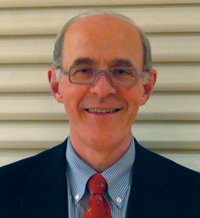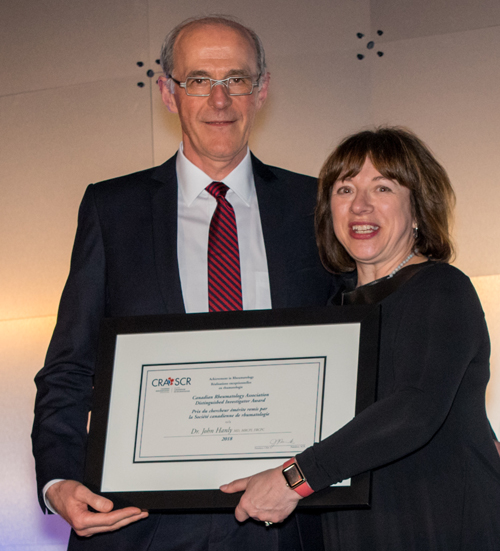Summer 2018 (Volume 28, Number 2)
Distinguished Investigator:
Dr. John G. Hanly
Download PDF

What was your first thought when you learned that you would receive this award?
I felt honoured and delighted to receive this prestigious award from the CRA, particularly in view of the calibre of previous recipients of the award. Being recognized by one’s peers is the highest of compliments in an academic career. I also regarded the award as tangible recognition of the supportive research culture provided by my Division members at Dalhousie University, Halifax.
Why did you become a rheumatologist? What or who influenced you along the way to do so?
I have had the good fortune to work with many inspiring individuals, many of whom were rheumatologists in Ireland and in Canada. The individual most responsible for stimulating my interest in our specialty was Dr. Barry Bresnihan who was my supervisor during a two-year research fellowship in Dublin, Ireland (1982-1984). He was a gifted clinician and researcher with a strong commitment to advancing patient care through innovation and discovery. He was my mentor and friend up to the time of his untimely death at the age of 67.
What do you believe are the qualities of a distinguished investigator?
Excitement about one’s subject, strategic planning with establishment of goals and milestones for success, persistence in the face of adversity, identifying good collaborators, mentoring of junior colleagues, perspective and a sense of humour.
Systemic lupus erythematosus (SLE) has been a major interest of yours, particularly its neuropsychiatric manifestations, but your work has touched on several areas of clinical rheumatology. With 230 publications to your credit, of which 150 are peer-reviewed original research, you have a notably prolific academic record. What are some of the major breakthroughs you’ve had with your research?
I do not claim to have had any “major breakthroughs” but I have attempted to advance the understanding of pathogenesis and clinical outcomes of rheumatic disease. In the field of neuropsychiatric SLE (NPSLE), my hope is that our work has provided a balanced assessment of both the positive and negative aspects of the illness and I hope that it will serve as a basis for future studies.
How do you manage your time to develop and publish so much original research?
Focus, persistence, prioritization and the good fortune to have excellent collaborators and supportive colleagues.
Are there other areas of interest you would like to investigate in the future? What projects will you be undertaking in the near future?
I continue to be interested in the nervous system manifestations of SLE. Currently, I am working with investigators at my own institution who have expertise in neuroimaging in order to gain insights into functional brain abnormalities in patients with SLE.
How does your research influence the clinical care of patients? What are you able to translate from research lab to examining room? What has been the most gratifying aspect of this knowledge translation?
Our studies on clinical outcomes of NPSLE have provided guidance for advising patients about what to expect from this particularly troubling manifestation of SLE and enhanced our abilities to manage it.

Dr. John Hanly receiving his award from Dr. Joanne Homik.
What have been the most rewarding aspects of going into the field of rheumatology and what have been some of the most challenging aspects?
The evolution of therapies for many rheumatic diseases from empiric compounds that were frequently ineffective to targeted therapies (biologics) with the ability to induce a sustained remission. Interacting with patients who cope so well with huge challenges imposed by their diseases. Terrific colleagues.
You were born in Ireland and obtained your medical degree at the National University of Ireland in Cork. Why did you eventually move to and stay in Canada? What do you most appreciate about Halifax?
Initially I came to Canada to gain additional training in rheumatology, but both my wife Noreen (also from Ireland and a physician) and I were open to the possibility of staying should the opportunity arise. Fortunately, we both obtained academic positions at Dalhousie University in Halifax and have never regretted our decision to sink anchor in this lovely part of the world.
You are marooned on a desert island? What book would you like to have on hand with you?
A year’s subscription to The Irish Times, with the option to renew.
You are handed a plane ticket to anywhere in the world. Where do you go?
New Zealand – pristine countryside, great wine, fly fishing and rugby (All Blacks).
What advice would you give to someone looking to pursue a career as an academic rheumatologist?
If you like challenging cases, using clinical acumen to make a diagnosis, building relationships with patients who struggle with chronic disease, utilizing basic science to better understand illness, having novel drugs to induce and maintain clinical responses, working with great colleagues – then this is the one for you!
Your identical twin is a successful Canadian respirologist. How have you influenced each other in life and in your medical careers? Have you ever collaborated in research?
Siblings are usually close but identical twins are closer still. Although we are both keen to succeed in our respective fields, our professional endeavours have not overlapped. In contrast, our extracurricular interests keenly intersect when it comes to fly-fishing and rugby!
John G. Hanly, MD, FRCPC
Professor of Medicine and Pathology,
Research Director,
Department of Medicine and Division of Rheumatology,
Dalhousie University and
Queen Elizabeth II Health Sciences Center,
Halifax, Nova Scotia
|
